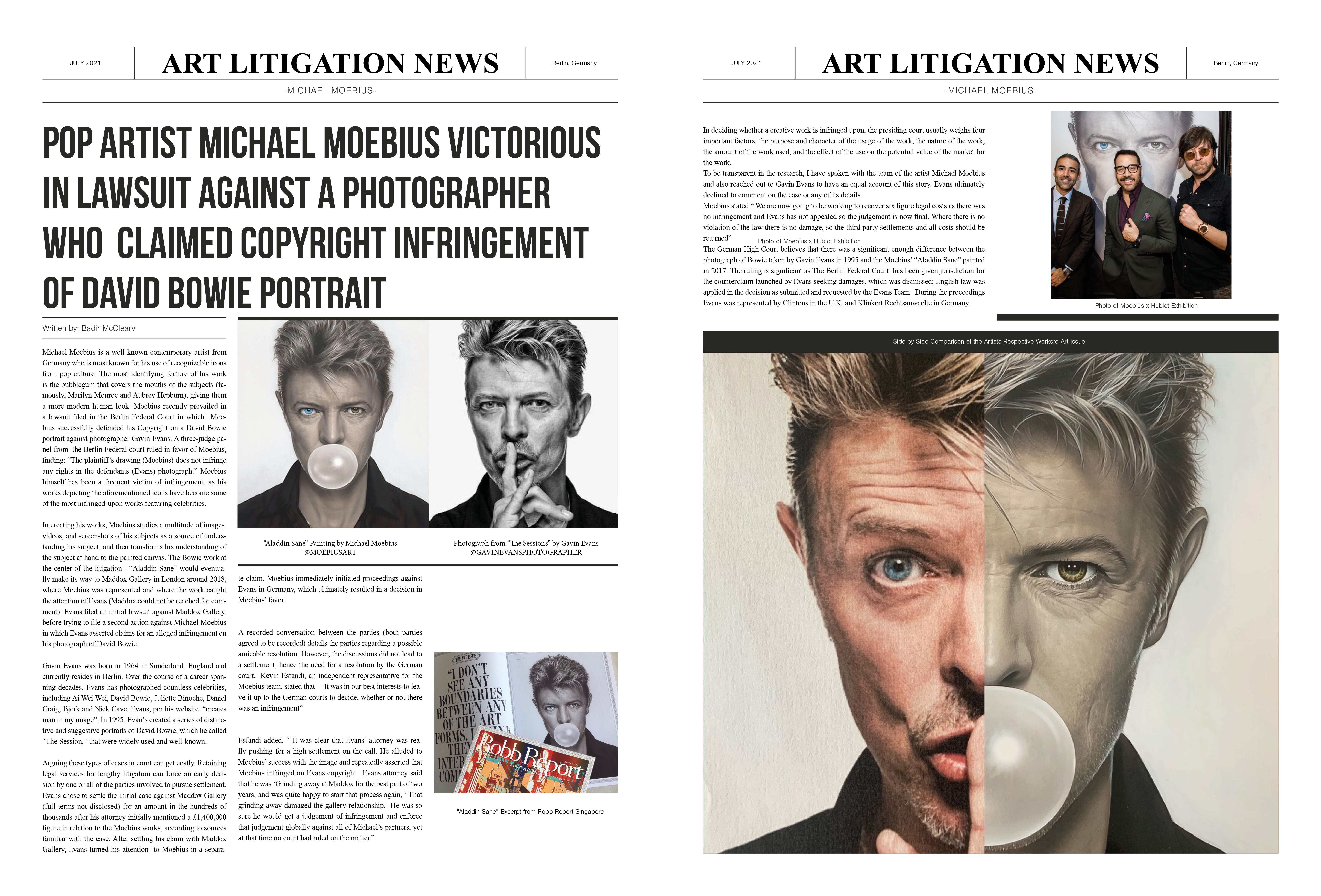
Michael Moebius is a well known contemporary artist from Germany who is most known for his use of recognizable icons from pop culture. The most identifying feature of his work is the bubblegum that covers the mouths of the subjects (famously, Marilyn Monroe and Aubrey Hepburn), giving them a more modern human look. Moebius recently prevailed in a lawsuit filed in the Berlin Federal Court in which Moebius successfully defended his Copyright on a David Bowie portrait against photographer Gavin Evans. A three-judge panel from the Berlin Federal court ruled in favor of Moebius, finding: “The plaintiff’s drawing (Moebius) does not infringe any rights in the defendants (Evans) photograph.” Moebius himself has been a frequent victim of infringement, as his works depicting the aforementioned icons have become some of the most infringed-upon works featuring celebrities.
In creating his works, Moebius studies a multitude of images, videos, and screenshots of his subjects as a source of understanding his subject, and then transforms his understanding of the subject at hand to the painted canvas. The Bowie work at the center of the litigation - “Aladdin Sane” would eventually make its way to Maddox Gallery in London around 2018, where Moebius was represented and where the work caught the attention of Evans (Maddox could not be reached for comment) Evans filed an initial lawsuit against Maddox Gallery, before trying to file a second action against Michael Moebius in which Evans asserted claims for an alleged infringement on his photograph of David Bowie.
Gavin Evans was born in 1964 in Sunderland, England and currently resides in Berlin. Over the course of a career spanning decades, Evans has photographed countless celebrities, including Ai Wei Wei, David Bowie, Juliette Binoche, Daniel Craig, Bjork and Nick Cave. Evans, per his website, “creates man in my image”. In 1995, Evan’s created a series of distinctive and suggestive portraits of David Bowie, which he called “The Session,” that were widely used and well-known.
Arguing these types of cases in court can get costly. Retaining legal services for lengthy litigation can force an early decision by one or all of the parties involved to pursue settlement. Evans chose to settle the initial case against Maddox Gallery (full terms not disclosed) for an amount in the hundreds of thousands after his attorney initially mentioned a £1,400,000 figure in relation to the Moebius works, according to sources familiar with the case. After settling his claim with Maddox Gallery, Evans turned his attention to Moebius in a separate claim. Moebius immediately initiated proceedings against Evans in Germany, which ultimately resulted in a decision in Moebius’ favor.
A recorded conversation between the parties (both parties agreed to be recorded) details the parties regarding a possible amicable resolution. However, the discussions did not lead to a settlement, hence the need for a resolution by the German court. Kevin Esfandi, an independent representative for the Moebius team, stated that - “It was in our best interests to leave it up to the German courts to decide, whether or not there was an infringement”
Esfandi added, “ It was clear that Evans’ attorney was really pushing for a high settlement on the call. He alluded to Moebius’ success with the image and repeatedly asserted that Moebius infringed on Evans copyright. Evans attorney said that he was ‘Grinding away at Maddox for the best part of two years, and was quite happy to start that process again, ’ That grinding away damaged the gallery relationship. He was so sure he would get a judgement of infringement and enforce that judgement globally against all of Michael’s partners, yet at that time no court had ruled on the matter.”
In deciding whether a creative work is infringed upon, the presiding court usually weighs four important factors: the purpose and character of the usage of the work, the nature of the work, the amount of the work used, and the effect of the use on the potential value of the market for the work.
To be transparent in the research, I have spoken with the team of the artist Michael Moebius and also reached out to Gavin Evans to have an equal account of this story. Evans ultimately declined to comment on the case or any of its details.
Moebius stated “ We are now going to be working to recover six figure legal costs as there was no infringement and Evans has not appealed so the judgement is now final. Where there is no violation of the law there is no damage, so the third party settlements and all costs should be returned”
The German High Court believes that there was a significant enough difference between the photograph of Bowie taken by Gavin Evans in 1995 and the Moebius’ “Aladdin Sane” painted in 2017. The ruling is significant as The Berlin Federal Court has been given jurisdiction for the counterclaim launched by Evans seeking damages, which was dismissed; English law was applied in the decision as submitted and requested by the Evans Team. During the proceedings Evans was represented by Clintons in the U.K. and Klinkert Rechtsanwaelte in Germany.
